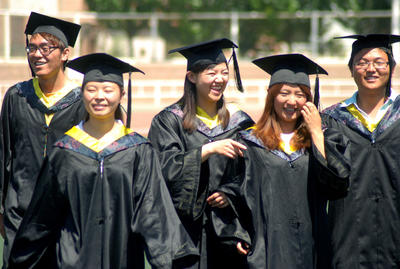The first identity crisis for Chinese students relates to their university’s perceived quality. Students usually have beautiful visions of university, but after entering they are disappointed to discover that the reality does not meet their expectations. This phenomenon is especially prevalent in some provincial universities as a result of the expansion of the Chinese university system. Prestigious universities are attractive to many young people, though they are able to accommodate few enrolments. Even many of those enrolled in top universities feel no sense of pride or achievement. Some drop out, grow weary of learning and are emotionally unstable.
Yet Chinese higher education is becoming more and more diversified. As long as university students are intelligent, diligent and motivated, they can achieve professionally irrespective of the university from which they graduate. Graduating from elite universities is just the ‘icing on the cake’ — it is not the source of miracles.
The second identity crisis relates to students’ majors. Many university students believe their major is not ‘hot’ and will not be useful for their future career. In other cases students take fashionable majors, even if they do not suit their individual learning capabilities or interests. They lose interest, which directly affects their motivation at university and can damage their future employment prospects.
Strangely, graduates who were greatly satisfied with their university majors are often not wholly satisfied with their jobs. The unsuitability of established specialities in universities partly explains this. Some universities have not been able to establish specialisations that are relevant to the needs of the industrial economy and the demands of local community development. According to data provided by Nanjing Talent Market, only one in every four graduates in popular courses such as accounting, law and advertising finds a job in their specialty. This affects students’ professional competence and their adaptability to social needs. Because of their limited resources, Chinese universities should foster strengths and circumvent weaknesses that have arisen within their own range of competencies.
Thirdly, students often experience an identity crisis in relation to their teachers. They usually have high expectations of their university professors — in their minds, university professors are meant to be both life mentors and intellectual role models. Yet the reality is often at odds with these expectations. Many students are dissatisfied with university teachers’ lack of knowledge and teaching ability, which causes them to disengage academically. This problem has been more common in provincial universities, which have proselytised higher standards of teaching quality. It is undeniable that there are problems with Chinese university teachers — especially young teachers. For instance, some teachers focus more on scientific research than teaching, while others cannot keep pace with the development of professional knowledge in their field, or are busy with public speaking engagements and neglect their university work. This directly affects university students’ identification with their teachers.
Lastly, many university students are at risk of developing self-esteem problems. Rapid development in China has brought better opportunities and more intense challenges than any previous era. In order to achieve success in a highly competitive environment, Chinese university students must have rich scientific knowledge and sound psychological foundations. They also need to have the ability to withstand setbacks. Yet many Chinese students are psychologically vulnerable, and lack the capacity to endure setbacks. On campus they might demonstrate an understanding of the concerns facing Chinese society, but once they graduate, they tend to be unprepared, bewildered and even afraid of employment.
According to a survey of the psychological health of university students carried out by the China Social Survey Institute in 2010, many students are under great pressure. Because of China’s family planning policy, many university students are the only children in their families; parents understandably expect great things from them. This pressure not only comes from their parents, but also from the fierce competition in Chinese society, and from their own ambition to succeed. All this causes them to worry about the future, to lose confidence and to feel depressed.
Importantly, the identity crisis of Chinese university students is not an independent social phenomenon. This is influenced by political, economical, cultural and other factors. Chinese higher education administrators and researchers will need to address the problem of the crisis of identity that faces university students today; otherwise it could lead to serious social problems more broadly.
Lili Liu is Professor at the Department of Culture and History, Central Party School, Beijing.


I totally agree with you.
Thanks.
I agree with you, Professor Liu. Many of the items you pointed out, also affect American students such as whether your major will be “hot” so you will able to get a job in it. Furthermore, it is no longer possible for Ame get a full-time permanent job.